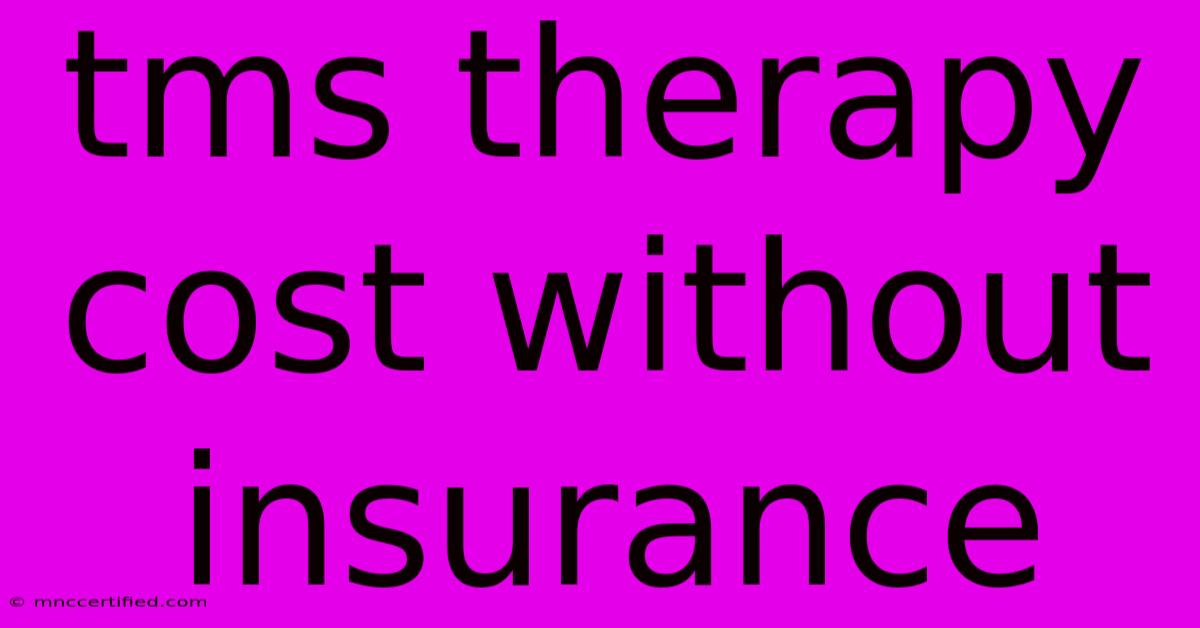Tms Therapy Cost Without Insurance

Table of Contents
TMS Therapy Cost Without Insurance: A Comprehensive Guide
Transcranial magnetic stimulation (TMS) therapy is a non-invasive treatment for depression and other mental health conditions. While it can be highly effective, a significant concern for many potential patients is the cost of TMS therapy without insurance coverage. This comprehensive guide will delve into the various factors influencing the price, ways to potentially reduce expenses, and alternative options to consider.
Understanding the Cost Variability of TMS Therapy
The price of TMS therapy without insurance can vary considerably depending on several key factors:
1. Number of Sessions:
TMS therapy typically requires multiple sessions, usually ranging from 30 to 40, spread over several weeks. The total cost is directly proportional to the number of sessions needed, which is determined by your individual response to the treatment and your doctor's assessment.
2. Geographic Location:
The cost of living and healthcare expenses differ significantly across geographic locations. Expect higher prices in major metropolitan areas compared to smaller towns or rural regions. This variation extends to the clinic's overhead costs and the practitioner's fees.
3. Type of TMS Device:
Different types of TMS devices exist, with varying technological advancements and associated costs. While all aim to achieve the same therapeutic effect, the technology used might influence the overall price. Some newer devices might offer more precise targeting and potentially reduce the number of required sessions.
4. Clinic Fees and Overhead:
Each clinic has its own pricing structure that encompasses various overhead costs – including rent, staff salaries, and equipment maintenance. These overhead costs are factored into the final price you'll pay.
Average Cost of TMS Therapy Without Insurance
Providing an exact average cost is challenging due to the aforementioned variables. However, you can expect to pay anywhere from $3,000 to $15,000 or more for a complete course of TMS therapy without insurance coverage. This significant range highlights the importance of obtaining multiple quotes from different clinics in your area.
Strategies to Manage the Cost of TMS Therapy
While the cost can seem daunting, several strategies can help manage the expense:
1. Shop Around and Compare Prices:
Contact multiple clinics in your area and request detailed price breakdowns. Don't hesitate to negotiate, especially if you're paying out-of-pocket.
2. Explore Financing Options:
Many clinics offer financing plans, allowing you to spread the cost over several months or years with manageable monthly payments. Check with your chosen clinic about available options.
3. Check for Discounts or Payment Plans:
Some clinics may offer discounts for cash payments or provide flexible payment plans tailored to individual financial situations. Inquire about these options directly.
4. Consider a Less Intensive Treatment Plan:
In certain cases, your physician might suggest a less intensive treatment plan, which can reduce the total number of sessions needed, thereby lowering the overall cost. However, effectiveness might be reduced.
Alternative Treatment Options
If TMS therapy's cost is prohibitive, explore alternative treatments for depression and related conditions. These might include:
- Medication: Antidepressant medication is often a more affordable first-line treatment option.
- Therapy: Cognitive Behavioral Therapy (CBT) and other therapeutic approaches can be effective for managing symptoms.
- Lifestyle Changes: Dietary changes, regular exercise, and sufficient sleep can significantly impact mental well-being.
Conclusion: Making Informed Decisions About TMS Therapy
The high cost of TMS therapy without insurance is a significant barrier for many. However, by understanding the contributing factors, comparing prices, exploring financing options, and considering alternative treatment paths, you can make an informed decision that aligns with your financial circumstances and health needs. Remember to always consult with your doctor or psychiatrist to determine the most appropriate treatment plan for your condition. Open communication with your provider about cost concerns is crucial in navigating the treatment process successfully.

Thank you for visiting our website wich cover about Tms Therapy Cost Without Insurance. We hope the information provided has been useful to you. Feel free to contact us if you have any questions or need further assistance. See you next time and dont miss to bookmark.
Featured Posts
-
Dallas Mavericks Loss Utahs Impact
Nov 16, 2024
-
Children In Need Stars Charity Show
Nov 16, 2024
-
Before Silo Season 2 Key Questions
Nov 16, 2024
-
How To Remove A Car From Insurance
Nov 16, 2024
-
Billy Bob Thorntons Creative Motivations
Nov 16, 2024